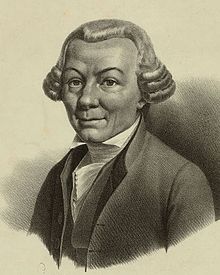Montpellier School
The School of Montpellier or Doctrine médicale de l'École de Montpellier, also briefly École de médecine de Montpellier, can be understood as a special direction of vitalism , as described by Théophile de Bordeu (1722–1776), Paul Joseph Barthez (1734–1806) and Louis de la Caze (1705-1765), was founded.
The French vitalism followed the considerations of Georg Ernst Stahl insofar as the living organism would be controlled by an internal vital principle, principle vital , and thereby it would differ from the inanimate, inorganic world surrounding it. The (complete) explanation of organic phenomena exclusively on the basis of knowledge of physical or mechanical laws was viewed as inadequate.
For Barthez, there was only one principle of life , for Bordeu it was a series of activities and local sensitivities that could not be reduced to the physics or chemistry that underpinned the process of life .
This school was characterized by two requirements that set it apart from previous teachings:
- it could not be satisfied with an animism , as advocated by Georg Ernst Stahl, according to which the “reasonable soul”, which is inaccessible to empirical research, was responsible for life processes;
- however, she also found a too strict separation of body and soul, as suggested by Cartesian philosophy, as an unsuitable solution to the mind-body problem .
Development tendencies
If the soul loses its special Cartesian position in the school of Montpellier , it gains a medical and scientific research quality which one z. B. with the catchphrase neurologization or, more generally, with the terms physiology , histology and physiological chemistry . This attitude of the school was also called "vitalistic materialism". However, it was precisely against this tendency that Stahl had defended himself, namely against the iatrophysics and iatrochemistry that were already prevalent during his lifetime . A middle position is thus pursued that takes into account both the physical-physical-organic aspects and the holistic aspects of the unity of the organism and which today could also be described as psychodynamic , cf. also the comparison of the forces agissantes (partial forces) and the forces radicales (basic forces) by Paul Joseph Barthez . - François Boissier de Sauvages de Lacroix (1706–1767) is often mentioned with Bordeu and Barthez . The French psychiatrist Philippe Pinel (1745–1826) studied with these for five years.
Works from school (selection)
- Louis de la Caze; Théophile de Bordeu: Idée de l'homme physique et moral. HL Guérin & LF Delatours, Paris 1775
- Paul-Joseph Barthez: Nouveaux éléments de la science de l'homme. 3.ed. Germer Baillière, Paris 1858
- Paul-Joseph Barthez: Nouveaux éléments de la science de l'homme. 2.ed. Goujon, Paris 1806
- Théophile de Bordeu: Œuvres completes de Bordeu. Ed., A. Richerand. Caille et Ravier. Paris 1818
literature
- AG Chevalier; John Gerlitt: The Montpellier Medical School. Basel 1937
- Bernward Josef Gottlieb: Significance and effects of the Halle professor and royal Prussia. Personal physician Georg Ernst Stahl on the vitalism of the XVIII. Century, particularly on the school of Montpellier. German Academy for Natural Scientists, Halle (Saale) 1943
- Anne C. Vila: Enlightenment and Pathology: Sensibility in the Literature and Medicine of Eighteenth-Century France. The Johns Hopkins University Press, Baltimore MD 1997, ISBN 0-8018-5809-7
- Elizabeth A. Williams: A Cultural History of Medical Vitalism in Enlightenment Montpellier. The History of Medicine in Context. Ashgate Publishing Limited 2003, ISBN 0-7546-0881-6
Web links
- Sabine Kraus: Lapeyronie et Barthez. Philosophy de l 'Ecole de médecine de Montpellier , online (PDF; 5.7 MB)
- Silvia Waissel; Maria Thereza Cera Galvão do Amaral II; Ana M. Alfonso-Goldfarb: Roots of French vitalism: Bordeu and Barthez, between Paris and Montpellier. Hist. cienc. saude-Manguinhos vol. 18 no.3 Rio de Janeiro July / Sept. (2011)
Individual evidence
- ↑ Elizabeth A. Williams: A Cultural History of Medical Vitalism in Enlightenment Montpellier (The History of Medicine in Context). Ashgate Publishing Limited, Burlington, VT 2003, ISBN 0-754-60881-6 .
- ^ A b Dörner, Klaus : Citizens and Irre . On the social history and sociology of science in psychiatry. 1969 Fischer Taschenbuch, Bücher des Wissens, Frankfurt / M 1975, ISBN 3-436-02101-6 ; (b) on taxation “Geistesströmungen”: p. 121 ff .; (a) Re. "Philippe Pinel": p. 152
- ↑ Temkin, Owsei : Materialism in French and German Physiology of the Early 19th Century. Bull. Hist. Med. 20: 15 ff., 1946
- ↑ Ackerknecht, Erwin H .: Brief history of psychiatry. Enke, Stuttgart 3 1985, ISBN 3-432-80043-6 ; P. 36


